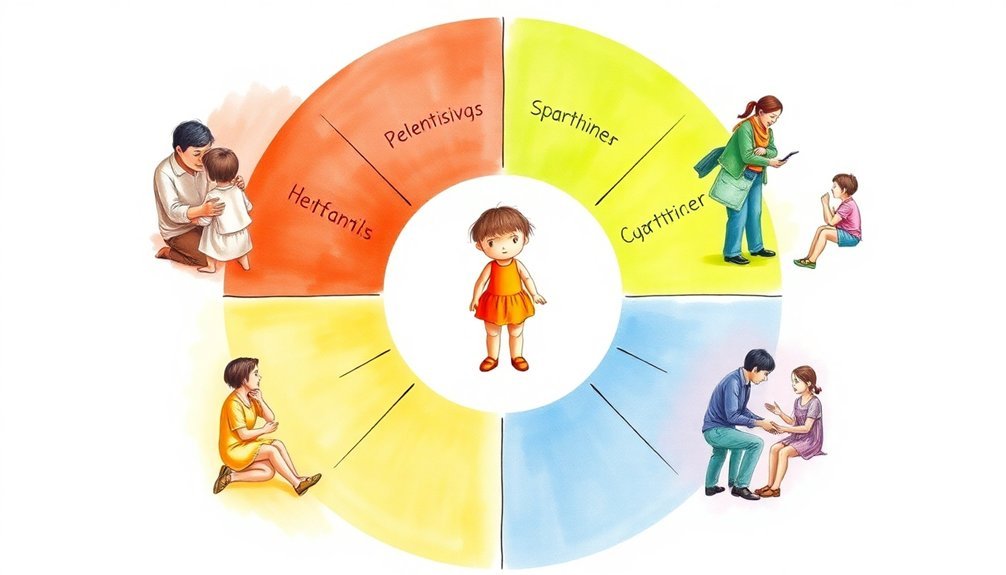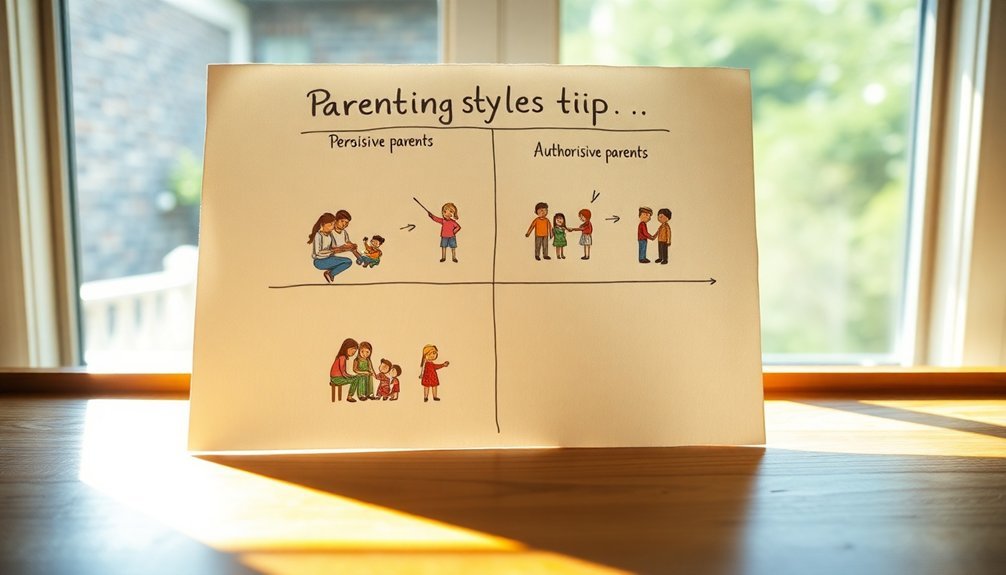You've likely noticed that parents around you handle their children differently, from the strict disciplinarians to the laid-back supporters. These distinct approaches aren't random—they fit into well-researched patterns that can greatly impact a child's future. As you navigate your own parenting journey or seek to understand the influences that shaped you, knowing these different styles will illuminate why some methods work better than others. The fascinating interplay between a parent's level of control and emotional responsiveness creates patterns that ripple through generations, affecting everything from a child's self-esteem to their future relationships.
Key Takeaways
- Four main parenting styles are authoritative, authoritarian, permissive, and uninvolved, each defined by levels of responsiveness and demandingness.
- Authoritative parenting combines high warmth with reasonable expectations, leading to better emotional regulation and academic success in children.
- Authoritarian parents enforce strict rules with minimal emotional support, while permissive parents offer warmth without clear boundaries.
- Uninvolved parenting shows limited engagement and emotional support, often resulting in developmental challenges and behavioral problems.
- Cultural influences shape parenting approaches, affecting how different styles are implemented across various societal and ethnic backgrounds.
What Are Parenting Styles
Parenting styles represent distinct approaches that caregivers use to raise their children, encompassing specific patterns of attitudes, behaviors, and communication methods. When you're looking at parenting definitions, you'll find that researchers have identified several core styles that shape how parents interact with and guide their children's development.
Through decades of parenting research, experts have discovered that these styles aren't just random choices – they're structured approaches that can greatly impact your child's emotional, social, and cognitive growth.
You'll find that each style reflects different levels of responsiveness and demandingness, two key dimensions that shape parent-child relationships.
Understanding these styles isn't about labeling yourself as a "good" or "bad" parent. Instead, it's about recognizing how your approach affects your child's development.
You'll often see that your natural parenting style might combine elements from different approaches, and that's perfectly normal. What matters most is being aware of how your parenting choices influence your child's outcomes, allowing you to make informed decisions about your parenting journey and adjust your approach when needed.
Types of Parenting Approaches

When you're learning about parenting approaches, you'll encounter four main categories: authoritative, authoritarian, permissive, and uninvolved parenting styles, each with distinct characteristics and outcomes.
Research shows that these styles greatly impact child development, with authoritative parenting typically producing the most positive results in areas like emotional regulation, academic achievement, and social competence.
You'll want to examine both the strengths and limitations of each approach to determine which elements align with your family's values and your children's needs.
Common Parenting Style Categories
Research in child development has identified four primary parenting styles that shape how adults interact with and raise their children. These established parenting style definitions include authoritative, authoritarian, permissive, and uninvolved approaches, each with distinct characteristics and outcomes.
You'll find authoritative parents maintain high expectations while providing warmth and support. They're firm but loving, setting clear boundaries while explaining the reasoning behind rules.
In contrast, authoritarian parents focus strictly on obedience and discipline, often using punishment without explanation. Parenting style examples show authoritarian parents saying "because I said so" rather than discussing rules.
Permissive parents tend to be lenient and indulgent, setting few rules and rarely enforcing consequences. They prioritize friendship with their children over guidance.
At the opposite end, uninvolved parents show minimal engagement in their children's lives, providing little emotional support or structure. They may meet basic needs but remain detached from their children's activities and development.
Understanding these categories helps you identify your natural parenting tendencies and make informed decisions about your approach to raising children.
Benefits and Drawbacks Analysis
Since each parenting style carries distinct implications for child development, understanding their benefits and drawbacks becomes essential for making informed decisions.
When you're evaluating different approaches, you'll find that a benefits analysis reveals authoritative parenting often produces confident, socially competent children with strong self-regulation skills. Meanwhile, permissive parenting can foster creativity and independence, though it may lack necessary boundaries.
A drawbacks analysis shows that authoritarian parenting, while providing clear structure, might lead to lower self-esteem and rebellious behavior in children. You'll notice that neglectful parenting consistently shows negative outcomes across all developmental areas.
Understanding these contrasts helps you adapt your approach to your child's needs.
You'll want to reflect that the most effective parenting often combines elements from different styles, taking the strengths while minimizing the weaknesses.
The Authoritarian Parent

Throughout many households, authoritarian parents rule with an iron fist, establishing strict rules and high expectations without considering their children's emotional needs.
You'll recognize their authoritarian characteristics through inflexible rules, demands for unquestioning obedience, and minimal emotional warmth in parent-child interactions.
These parents often employ harsh discipline techniques, including punitive consequences, threats, and yelling to guarantee compliance.
They'll frequently use phrases like "Because I said so" rather than explaining their reasoning, leaving children feeling powerless and unheard.
Research shows that children raised under this style often struggle with self-esteem, decision-making, and emotional regulation.
If you've identified these patterns in your parenting approach, you can shift toward a more balanced style by:
- Explaining your reasoning behind rules
- Creating space for open dialogue
- Acknowledging your child's feelings
- Setting appropriate boundaries while showing warmth
- Replacing harsh punishments with logical consequences
The Permissive Parent

Permissive parents offer abundant emotional warmth and support but establish minimal rules or boundaries for their children's behavior.
You'll notice these parents often avoid confrontation and prefer to position themselves more as friends than authority figures, creating an environment with limited structure and guidance.
While you might appreciate their nurturing approach, research shows that children raised in permissive households can struggle with self-regulation and understanding limits, as they've experienced few consistent consequences for their actions.
Few Rules or Boundaries
Parents who lean toward a permissive style typically shy away from setting clear boundaries, preferring instead to act more like friends than authority figures to their children.
You'll notice these parents often establish flexible guidelines rather than firm rules, allowing their children significant freedom in decision-making and behavior.
While this approach might seem appealing, research shows that children need consistent structure to develop self-regulation skills. When you're operating with adaptive boundaries that frequently shift or disappear altogether, your children may struggle to understand acceptable behavior limits.
They might find it challenging to cope with stricter environments like school or future workplaces.
You can strengthen your parenting approach by gradually implementing basic rules while maintaining your warm, accepting nature.
Start with essential safety and respect-based boundaries, then consistently enforce them.
This doesn't mean becoming rigid – you're simply providing the framework your child needs to develop responsibility and self-discipline.
Remember, children actually feel more secure when they understand what's expected of them, even if they initially resist these limitations.
High Emotional Support Given
Providing abundant emotional warmth characterizes the permissive parenting approach, where affection and support flow freely between parent and child.
You'll find yourself creating a highly supportive environment where your child's emotional needs take center stage. This style of emotional nurturing helps develop strong parent-child bonds and fosters open communication channels.
Your approach to parenting emphasizes understanding and validation of your child's feelings, creating a safe space for them to express themselves without fear of judgment.
Research shows that children raised in emotionally supportive households often develop higher self-esteem and better emotional intelligence.
- You actively listen to your child's concerns and validate their feelings, even when disagreeing with their choices.
- You're readily available for emotional comfort, offering hugs, encouraging words, and quality time.
- You create opportunities for open dialogue, making your child feel heard and understood.
- You demonstrate unconditional love while helping your child process difficult emotions.
When implementing this high emotional support approach, you'll notice your child becoming more comfortable sharing their thoughts and feelings with you, though it's crucial to balance this warmth with appropriate guidance and structure.
Limited Structure and Discipline
While emotional support flows freely in this parenting style, the approach to rules and consequences often remains minimal. You'll notice that permissive parents typically avoid setting firm boundaries, preferring to maintain peace through flexible expectations and limited guidance. This creates an environment where children experience few restrictions but may struggle with self-regulation and understanding limits.
When you adopt this parenting approach, you're likely to negotiate with your children rather than establish clear rules. You'll find yourself reluctant to enforce consequences, potentially leading to challenges in your child's development of self-discipline.
Research shows that children raised in this style often struggle with academic performance and behavioral boundaries in structured settings like school.
Your desire to maintain a close, friendly relationship with your children through minimal discipline can impact their ability to handle frustration and follow external rules. While your children may feel loved and supported, they might need additional structure to develop vital life skills.
Consider incorporating consistent, age-appropriate boundaries while maintaining your nurturing approach to help your children develop both emotional security and self-discipline.
The Authoritative Parent

The authoritative parenting style stands out as the most effective approach for raising well-adjusted children, according to decades of research.
You'll find that authoritative characteristics include high responsiveness paired with reasonable expectations, creating a balanced environment where children thrive. When you adopt this style, you're establishing clear boundaries while maintaining warmth and open communication.
Studies consistently demonstrate parenting effectiveness through these key elements of authoritative parenting:
- You set clear expectations and explain the reasoning behind rules, helping your child understand why certain behaviors matter.
- You're responsive to your child's emotional needs while maintaining consistent discipline.
- You encourage independence and critical thinking by allowing age-appropriate choices.
- You practice positive reinforcement rather than harsh punishment to guide behavior.
The Uninvolved Parent

In stark contrast to authoritative parenting, uninvolved parents demonstrate minimal engagement in their children's lives, creating essential developmental risks. You'll notice these parents exhibit emotional detachment and often fail to meet their children's basic emotional and physical needs.
They're typically disconnected from their child's school activities, daily routines, and emotional experiences.
The effects of parental neglect can be far-reaching. If you're working with children from uninvolved homes, you'll observe they often struggle with self-esteem issues, behavioral problems, and difficulty forming healthy relationships.
Research shows these children are more likely to experience academic challenges and emotional regulation problems.
If you recognize these patterns in your parenting or see them in others, it's vital to understand that change is possible. Professional support through family counseling can help break cycles of detachment.
You can start by setting small, achievable goals for daily interaction with your child, such as dedicated conversation time or shared activities.
Impact on Child Development

Parenting styles reach far beyond daily interactions to shape children's cognitive, emotional, and social development throughout their lives. When you understand how your parenting approach affects your child's development, you'll be better equipped to make informed decisions that support their growth and well-being.
Research consistently shows that parenting styles greatly influence child behavior and personality traits in several key areas:
- Emotional intelligence and self-esteem develop through consistent, supportive parent-child interactions, affecting how children process feelings and build resilience.
- Social skills and peer relationships flourish when parents model healthy communication and provide appropriate guidance in family dynamics.
- Cognitive development and academic performance are enhanced when parents create stimulating environments and maintain reasonable expectations.
- Personality traits and coping mechanisms form based on how parents respond to their children's needs and challenges.
You'll notice that children's responses to different parenting styles often manifest in their ability to regulate emotions, form relationships, and navigate challenges.
Cultural Influences on Parenting

While child-rearing practices vary considerably across cultures, each society's values, beliefs, and traditions fundamentally shape its accepted parenting norms. You'll notice that cultural norms often dictate whether parents emphasize independence or interdependence, individual achievement or collective harmony, and strict discipline or permissive guidance.
When you're raising children, you'll find that your parenting practices are heavily influenced by both your ethnic influences and religious beliefs. These shape everything from sleep routines to meal times, disciplinary approaches to educational priorities.
You'll also discover that social expectations within your community values play an essential role in determining what's considered "good parenting."
Family traditions passed down through generations create distinct parenting patterns, though you might notice significant generational differences as societies evolve. For instance, if you're from a culture that traditionally valued strict obedience, you may now find yourself adapting to more democratic parenting approaches.
Understanding these cultural influences helps you navigate between preserving important heritage elements while adapting to contemporary parenting needs in your multicultural world.
Creating Your Parenting Strategy

Armed with knowledge of cultural influences, you're ready to develop your own unique parenting approach. Creating an effective parenting strategy requires careful consideration of your family's values, your children's individual needs, and your long-term parenting goals.
You'll need to remain flexible, making strategy adjustments as your children grow and circumstances change.
To create a well-rounded parenting strategy that works for your family, consider these essential steps:
- Define your core family values and specific parenting goals, writing them down to maintain clarity and commitment.
- Assess your current parenting practices, identifying which methods align with your goals and which need adjustment.
- Create a practical action plan that incorporates consistent routines, clear boundaries, and age-appropriate expectations.
- Establish regular check-ins to evaluate your strategy's effectiveness and make necessary adjustments.
Remember that your parenting strategy shouldn't exist in isolation. Connect with other parents, seek professional guidance when needed, and stay informed about child development research.
Your approach should feel authentic to you while remaining responsive to your children's evolving needs. Success comes from maintaining consistency while being willing to adapt when something isn't working.
Frequently Asked Questions
Can Parenting Styles Change as Children Grow Older?
Yes, your parenting style can and should adapt as your children grow.
You'll notice changing dynamics that require evolving strategies to meet your child's developing needs. What works for your toddler won't necessarily suit your teenager.
You'll find yourself adjusting your approach based on your child's maturity, independence levels, and unique challenges.
Being flexible in your parenting style helps maintain strong connections while supporting your child's growth.
How Do Parents With Different Parenting Styles Effectively Co-Parent?
You'll find that co-parenting across different parenting styles can work when you prioritize effective communication and mutual respect.
Start by identifying common ground in your parenting goals and values. It's crucial to establish consistent rules between households while allowing for some flexibility.
When you're facing challenges, focus on problem-solving rather than criticizing each other's approaches.
What Role Does Genetics Play in Determining Effective Parenting Styles?
While genetic influence plays a role in your parenting traits, research shows it's not the sole determining factor.
You'll find that about 23-40% of parenting behaviors have a hereditary component, but your experiences, education, and conscious choices have a greater impact.
Don't feel limited by your genetic predispositions – you can learn and adapt effective parenting strategies that work best for your family, regardless of inherited tendencies.
How Do Single Parents Adapt These Parenting Styles to Their Situation?
Ever wonder how single parents navigate the challenging waters of raising children alone?
You'll find that single parent adaptation often requires greater parenting style flexibility. You can blend different approaches to meet your unique situation – combining authoritative structure with permissive warmth when needed.
It's important to remember that you're not limited to one style; instead, focus on creating consistent routines, maintaining open communication, and building a strong support network.
Can Mixing Different Parenting Styles Harm a Child's Development?
When you mix parenting styles inconsistently, it can create confusion and affect your child's developmental outcomes.
However, you're not harming your child if you thoughtfully combine effective elements from different approaches.
The key is maintaining consistency in your core values while adapting to your child's needs.
Research shows that mixed influences can actually be beneficial when you're intentional and responsive, rather than erratic or unpredictable in your parenting approach.
Conclusion
Like a skilled gardener choosing the right tools and techniques, you'll find that understanding parenting styles empowers you to nurture your child's growth effectively. Your choice between firm boundaries (authoritarian), gentle guidance (permissive), balanced support (authoritative), or hands-off (uninvolved) approaches will shape your child's future, much as different soils influence a plant's development. Armed with this knowledge, you're better equipped to cultivate a thriving family environment that matches your values and your child's needs.








0 responses to “Understanding Different Parenting Styles Chart”